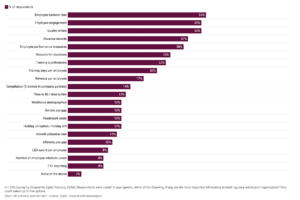Only one-third of employers are fully leveraging their people data for informed workplace decisions, according to a new report.
Ciphr’s survey of 300 HR professionals in the United Kingdom found that just 32% believe their organizations fully utilize people data for decision-making.
Furthermore, only 36% believe their organizations actively seek HR’s input for business decisions. Claire Williams, chief people and operations officer at Ciphr, criticized this approach as “incredibly short-sighted.”
“It’s crucial to recognize the significant impact that utilizing people data can have on overall company performance,” Williams stated. “People costs can constitute at least 80% of an organization’s P&L (profit and loss), so this data should be analyzed and utilized extensively—just like sales, marketing, and pipeline data.”

Williams pointed out that without a clear focus on people data, business leaders will struggle to address employment challenges, such as retention or training needs.
“Can you easily identify your risks related to turnover or burnout without in-depth workforce reporting?” she asked. “HR teams need access to robust people data to address these questions. This is especially important as HR gains more strategic recognition at the board level.”
Necessary HR Metrics
What kind of people data is essential to track? HR leaders identified the employee turnover rate as the most important metric, followed by employee engagement and quality of hires. Absence records, employee performance measures, and reasons for absences are also crucial.

Williams emphasized that people data is vital for businesses to identify and harness their talent, ensuring continued growth and success. “An improved understanding of your workforce can boost business confidence, allowing you to scale your people in line with forecasted growth,” she said.
“Workforce planning informed by data enables timely hiring, preventing capacity gaps from affecting customers. It provides a clearer, evidence-backed picture of how long it takes new employees to become competent and start contributing effectively,” Williams concluded.





